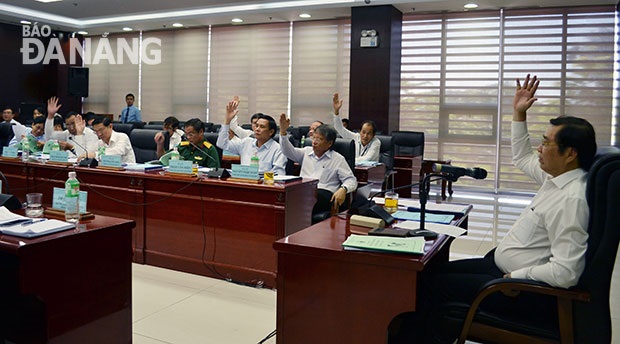1st session of municipal People's Committee opens
The 1st session of the Da Nang People’s Committee (PC) for the 2016 - 2021 tenure took place on 20 and 21 July. Present at the event was PC Chairman Huynh Duc Tho and other city leaders.
 |
| The participants passing the session’s agenda |
The session’s agenda highlighted amendments to the city’s Decision No 14/2009/QD-UBND concerning the granting of regular and emergency allowances to local social beneficiaries who suffer life-threatening diseases and live in difficult circumstances.
There were also discussions about the delayed local projects whose land will be revoked, the adjustments to the city’s urban planning work towards 2020, and the use of local land resources over the 2016 - 2020 period. The adjustments will be submitted to the central government for consideration and approval.
The regulations about developing high-quality human resources for local public services by 2020 were also presented at the meeting.
In particular, the participants also heard reports on estimates of the city’s budget over the first half of this year, effective measures to ensure the efficient use of the budget for the rest of the year, and the regulations about the collection of fees and other related charges across the city.
Discussions focussed on material aid for private day-care centres for children in local industrial parks (IPs) and export processing zones, and adjustments to the granting of workday allowances to local militia forces.
Also raised at the meeting were the regulations about medical fees charged at the recently-established ward for international-standard treatment services at the city’s General Hospital.
Chairman Tho stressed the need for the city authorities to uphold their responsibilities, leadership capacity, flexibility and creativity in order to help the city fulfil this year’s key tasks successfully.
The focus will be on maintaining the city’s socio-economic growth, especially stable tax collections, mobilising all resources for promoting infrastructure development at IPs and export processing zones, and implementing social welfare programmes.